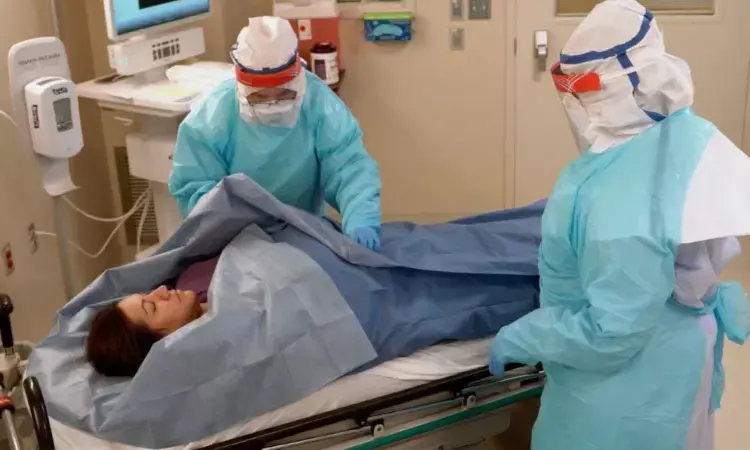- Home
- Medical news & Guidelines
- Anesthesiology
- Cardiology and CTVS
- Critical Care
- Dentistry
- Dermatology
- Diabetes and Endocrinology
- ENT
- Gastroenterology
- Medicine
- Nephrology
- Neurology
- Obstretics-Gynaecology
- Oncology
- Ophthalmology
- Orthopaedics
- Pediatrics-Neonatology
- Psychiatry
- Pulmonology
- Radiology
- Surgery
- Urology
- Laboratory Medicine
- Diet
- Nursing
- Paramedical
- Physiotherapy
- Health news
- Fact Check
- Bone Health Fact Check
- Brain Health Fact Check
- Cancer Related Fact Check
- Child Care Fact Check
- Dental and oral health fact check
- Diabetes and metabolic health fact check
- Diet and Nutrition Fact Check
- Eye and ENT Care Fact Check
- Fitness fact check
- Gut health fact check
- Heart health fact check
- Kidney health fact check
- Medical education fact check
- Men's health fact check
- Respiratory fact check
- Skin and hair care fact check
- Vaccine and Immunization fact check
- Women's health fact check
- AYUSH
- State News
- Andaman and Nicobar Islands
- Andhra Pradesh
- Arunachal Pradesh
- Assam
- Bihar
- Chandigarh
- Chattisgarh
- Dadra and Nagar Haveli
- Daman and Diu
- Delhi
- Goa
- Gujarat
- Haryana
- Himachal Pradesh
- Jammu & Kashmir
- Jharkhand
- Karnataka
- Kerala
- Ladakh
- Lakshadweep
- Madhya Pradesh
- Maharashtra
- Manipur
- Meghalaya
- Mizoram
- Nagaland
- Odisha
- Puducherry
- Punjab
- Rajasthan
- Sikkim
- Tamil Nadu
- Telangana
- Tripura
- Uttar Pradesh
- Uttrakhand
- West Bengal
- Medical Education
- Industry
WHO Issues new Infection Control Guidelines for Ebola, Marburg, and COVID-19

Switzerland: The World Health Organization (WHO) has released updated infection control guidelines in response to ongoing Ebola and Marburg outbreaks, as well as the evolving COVID-19 pandemic. These guidelines emphasise the importance of infection prevention not only in healthcare facilities but also within the community, highlighting the need for early recognition, rapid source control, and protective measures.
For Ebola and Marburg, the WHO recommends implementing no-touch screening at the first point of contact for all individuals, including patients, visitors, and healthcare workers. In cases where maintaining a safe distance is challenging, healthcare workers should wear appropriate personal protective equipment (PPE), including masks, eye protection, fluid-resistant gowns, and gloves. The guidance also emphasises the importance of directly engaging with family members and visitors to provide information and support.
Crucially, the WHO discourages the practice of spraying healthcare workers with disinfectant during the removal of PPE. Proper hand hygiene, including the use of alcohol-based hand rub or soap and water, is also highlighted as a fundamental measure.
Turning to COVID-19, the updated recommendations stress the protection of healthcare workers as a top priority. The use of facial masks is a cornerstone of prevention, with evidence showing their effectiveness in curbing the transmission of SARS-CoV-2. However, the decision to implement universal masking in healthcare settings and the community should be based on best judgement, especially during active outbreaks. Healthcare workers are also urged to use their discretion when deciding whether to wear masks while caring for routine patients.
To ensure the safety of both healthcare workers and patients, passive screening for COVID-19 symptoms, as well as symptoms of other respiratory infections, is being introduced. Symptomatic healthcare workers are advised to refrain from in-person patient care and isolate according to local guidelines. Vaccination, including booster doses, is recommended for clinicians and healthcare personnel to enhance their protection against the virus.
While community-based guidelines are still being reviewed, the WHO emphasises the importance of proper masking in situations of active outbreaks, crowded spaces, and when sharing space with an infected individual. The guidelines encourage continued education on COVID-19 prevention, including up-to-date vaccinations and appropriate precautions for vulnerable populations.
In summary, the WHO's updated infection control guidelines address a broad spectrum of measures, from healthcare facilities to the community, in the ongoing efforts to combat Ebola, Marburg, and COVID-19. By emphasizing early recognition, protection, and education, these guidelines offer a comprehensive approach to disease prevention and transmission mitigation.
Reference:
Infection prevention and control guideline for Ebola and Marburg disease, August 2023. Geneva: World Health Organization; 2023 (WHO/WPE/CRS/HCR/2023.1)
Dr Kamal Kant Kohli-MBBS, DTCD- a chest specialist with more than 30 years of practice and a flair for writing clinical articles, Dr Kamal Kant Kohli joined Medical Dialogues as a Chief Editor of Medical News. Besides writing articles, as an editor, he proofreads and verifies all the medical content published on Medical Dialogues including those coming from journals, studies,medical conferences,guidelines etc. Email: drkohli@medicaldialogues.in. Contact no. 011-43720751


